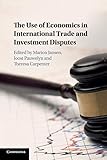The use of economics in international trade and investment disputes / edited by Marion Jansen, Joost Pauwelyn and Theresa Carpenter, .
Publisher: Cambridge, United Kindgom ; New York, NY : Cambridge University Press, 2017Description: xvii, 398 pages : illustrations ; 24 cmContent type:- text
- unmediated
- volume
- 9781316508053
- 343.087 JAN 23
- K2400 .U814 2017
- LAW014010
| Item type | Current library | Call number | Status | Date due | Barcode |
|---|---|---|---|---|---|
 BOOKs
BOOKs
|
National Law School | 343.087 JAN (Browse shelf(Opens below)) | Available | 37452 |
Includes bibliographical references and index.
Machine generated contents note: 1. Introduction: the use of economics in international trade and investment disputes Marion Jansen, Joost Pauwelyn and Theresa Carpenter; Part I. The Use of Economics in International Trade and Investment Disputes: A Practitioner's View: 2. Integrating economic analysis into WTO dispute settlement practice: a view from the trenches Robert Teh and Alan Yanovich; 3. Present at the creation: economists and accountants in international trade law practice Thomas Graham; 4. The role of economics in WTO dispute settlement and choosing the right litigation strategy - a practitioner's view Christian Lau and Simon Schropp; 5. On interpretation and economic analysis of law David Unterhalter; 6. The client's perspective James Flett; 7. The use of economics in competition law: what works and what doesn't across national jurisdictions? Bruce Malashevich; Part II. The Use of Economics in International Trade Disputes: Economic Versus Legal Thinking: 8. What to do if economic insights are disputed: on the challenge to deal with competing and evolving theories or empirics in international trade disputes Anne van Aaken; 9. Lost in translation: communication and interpretation challenges related to economic evidence in trade disputes Marion Jansen and Marios Iacovides; 10. Land rich and cash poor? The reluctance of the WTO dispute settlement system to entertain economics expertise: an institutional analysis Petros Mavroidis and Damien Neven; 11. The economics of actionable subsidy disputes Jorge Miranda; 12. In search of a 'genuine and substantial' cause: the analysis of causation in serious prejudice claims Pablo M. Bentes; 13. The games we play - simulation models in merger analysis and their potential use in trade litigation Amar Breckenridge; Part III. The Use of Economics in International Investment Disputes: Liability and Damages: 14. Aligning loss, liability and damages: towards an integrated assessment of damages in investment arbitration Wolfgang Alschner; 15. An economic assessment of contracts and requests for contract reform and damages in international arbitration Bastian Gottschling and Willis Geffert; 16. Economics in investor-state arbitration beyond quantum Carla Chavich and Pablo Lopez; 17. Assessing investor damages involving publicly traded companies - with examples from the Yukos' cases Manuel A. Abdala and Alan Rozenberg; 18. From the law of valuation to valuation of law? On the interplay of international law and economics in fair-market valuation Fuad Zarbiyev; Conclusion Theresa Carpenter, Marion Jansen and Joost Pauwelyn; Appendix. Guidelines for best practices for the use of economics in WTO dispute settlement Theresa Carpenter, Marion Jansen and Joost Pauwelyn.
"Twenty-first-century trade agreements increasingly are a source of international law on investment and competition. With chapters contributed by leading practitioners and academics, this volume draws upon investor-state arbitration and competition/antitrust disputes to focus on the application of economics to international trade law and specifically WTO law. Written in an accessible language suitable for a broad readership while providing concrete insights designed for the specialist, this book will be of use to those active or interested in the related fields of trade disputes, competition law, and investor-state arbitration"-- Provided by publisher.
"Global markets have become increasingly integrated both in terms of the size of trade and investment flows and in terms of the number of players involved. Global trade and investment flows are governed by a set of national, regional and global legal frameworks that interact at different levels. Increasingly the question arises how those frameworks fit together and how they can be made more coherent"-- Provided by publisher.

There are no comments on this title.